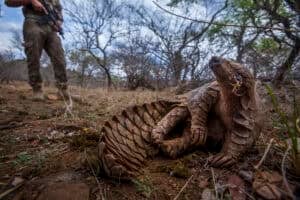Chad is far from stable and all their rhinos were hunted to extinction long ago already.

A 2013 pledge by Jacob Zuma saw six rare black rhino translocated this week to a country ranked one of the most corrupt on the continent, immersed in political turmoil, and where rhino went extinct in 1972 thanks to poaching.
“By establishing a viable and secure rhino population of rhino in Chad, we are contributing to the expansion of the rhino population in Africa, and the survival of a species that has faced high levels of poaching for the past decade,” said Department of Environmental Affairs (DEA) Minister Edna Molewa.

SANParks capture coordinator, Lourens de Lange with Malamani at the rhino bomas in Addo Elephant National Park near Port Elizabeth in the Eastern Cape, 2 May 2018. Picture: Neil McCartney
DEA spokesperson Albi Sachs said the translocation of black rhino was achieved through a collaboration between the department, Chad, SANParks and the African Parks Foundation.
“The rhino were translocated to the Zakouma National Park, which has experienced a dramatic decrease in poaching since 2010, with the local elephant population increasing for the first time in more than a decade,” Sachs said.
Chad joins a long list of beneficiaries of African countries by South Africa which have faced an onslaught of rhino poaching.
Black rhino have been translocated by SANParks to Botswana, Tanzania, Zambia, Malawi, and Rwanda while white rhino were moved to Botswana, Namibia, Zambia, and Mozambique.
“Rhino have also been translocated to Kenya and Swaziland by South Africa,” Sachs said.
African Parks has had huge hurdles to overcome as well.

Renaissance the rhino at the rhino bomas in Addo Elephant National Park near Port Elizabeth in the Eastern Cape, 2 May 2018. Picture: Neil McCartney
“In addition to rhinos becoming locally extinct in 1972, poaching also decimated the park’s elephant population. In 2002, Zakouma was home to more than 4,000 elephants – but by 2010 after an eight-year onslaught of poaching for their tusks, only 450 remained. However, the park was transformed when African Parks, in partnership with the Government of Chad, assumed management in 2010. We overhauled law enforcement and worked closely with the local communities to protect the park,” a statement on the organisation’s website states.
African Parks spokesperson Fran Read told The Citizen the elephants had dedicated teams of rangers that kept a close eye on them, and the same protection would be afforded to the country’s new guests.
However, the country has problems of its own.
AFP reported yesterday Chad was struggling with a jihadist insurgency that spilled over from neighbouring Nigeria.
“The country is allied with the United States in anti-terror operations, authorising the US military to have a drone unit, according to a Chadian military official,” AFP reported, stating the US had handed over two light reconnaissance aircraft to Chad to help its forces fight a jihadist insurgency.
Yet, with considerable distance between Lake Chad where the West African Islamic State was gathering and Zakoumi, Terrorism Research & Analysis Consortium director Jasmine Opperman said opportunism was more of a threat than organised crime.
“Yes, there have been reports about groups such as al-Shabaab profiting from wildlife poaching as a stream of financial income. Yes, it remains a possibility, however, the reports have never been verified,” Opperman said.

A note from children in Chad for their new rhinos at the rhino bomas in Addo Elephant National Park near Port Elizabeth in the Eastern Cape, 2 May 2018. Picture: Neil McCartney
“The issue relates more to organised crime in that area, but with six rhino the immediate threat is opportunistic crime rather than extremist groups coming in.”
Opperman noted Zakoumi was not an area of terrorist activity at the moment and that while the country’s dynamics were changing any jihadist activity would have little impact in central Chad where Zakoumi is based.
Deby took power in 1990 and has been the Chadian president since. Yesterday he signed into law a full presidential regime without prime minister or vice-president, who stood down on Thursday.
Outraged SA Citizens Against Poaching’s Kim Da Rebeira said the organisation had some concerns.
“The rhino are being translocated under a custodianship agreement and realistically the possibility that these rhino will return to South Africa is slim. We are still awaiting the census figures for KNP for 2017, and we have reached May 2018 and the poaching stats for the first quarter of 2018 have not been released. Can we afford to send these rhino to Chad?” Da Reibeira wondered.
“Then there is the matter of an affiliate of ISIS, ISWA, who have established a presence in the Lake Chad area. We hope that the reintroduction of rhino to Chad will not place unwanted focus on Zakouma and that as a result the rhino and elephant populations there will be at risk from poaching.”
Also read: Kruger rhino deaths down, but KZN up
For more news your way, follow The Citizen on Facebook and Twitter.






